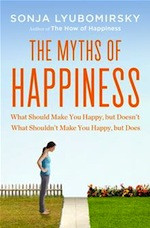Did you ever think marrying the love of your life would make you happy only to find yourself miserable two years into your marriage? Or have you ever been so unhappy at work that you decided to quit your job only to discover later how much you miss it, especially now that the economy has fallen apart?
According to Sonja Lyubomirsky, psychology professor at the University of California, Riverside, you are not alone: we are all subject to wrong-headed thinking about what will make us happy (or unhappy).
As she argues in her new book, The Myths of Happiness, many of us hold on to fallacious ideas about happiness, thinking we’d be happier if we had the right relationship, job, health, or… [fill in the blank]. The problem is that these thoughts keep us stuck and don’t reflect the reality of how one cultivates happiness in life.
Researchers have long known that we have happiness set points that play a role in determining how happy we can be. If we have moments of great joy or sorrow, we will, generally speaking, return to our happiness set point down the road. But luckily our set points are not inflexible, and we can actually do things to help us become happier people overall, which is what Lyubomirsky’s book aims to teach.
Each chapter in Lyubomirsky’s book deals with one of the myths of happiness, helping readers to identify what assumptions are in play and how to counteract them. For example, in chapter one, titled “I’ll Be Happy When…I’m Married to the Right Person,” she explains the phenomenon called hedonic adaptation, a kind of diminishing return on happiness. As we experience happiness highs, we soon become inured to them, taking them for granted, and needing more in order to be happy.
How this plays out in relationships is obvious: the first kiss is never as exciting as the next, the honeymoon lasts only the first year, etc. When we don’t recognize this fact of life, Lyubomirsky warns, we risk expecting more from our relationship than it can possibly give and end up making poor decisions, like ending our relationship instead of nurturing it.
How can we counteract hedonic adaptation? Lyubomirsky suggests fostering appreciation for our partner, even as we realize they are not perfect.
“Appreciating our relationship compels us to extract the maximum possible satisfaction from it and helps us to be grateful for it, relish it, savor it, and not take it for granted,” she writes.
Cultivating appreciation also helps us to feel better about ourselves, more connected to others, more motivated to nurture the relationship, and less likely to compare our situation to others and become envious, she writes.
Research shows that novelty and surprise can also help keep the love alive, according to Lyubomirsky. When we are surprised by something, we tend to “stand to attention and hence are more likely to appreciate it, to contemplate it, and remember it.” She suggests shaking up our routines, trying out new restaurants or activities, learning a new sport or language together, or even doing something wacky together. Anything novel can be a path to greater happiness in our relationship…as long as it’s focused on positive experiences, of course.
Lyubomirsky’s book deals with many of the big life issues, such as having kids, finding meaningful work, making enough money, experiencing declining health with age, and looking back on life with regrets. Each chapter tackles a happiness fallacy—e.g., I can’t be happy if I’m broke, or I won’t be happy until I have kids—with the same kind of analysis and research-based tips for overcoming them.
Her main message is that we can all learn to apply what’s known about happiness to our own life circumstance and make better choices for ourselves. Unlike Daniel Gilbert’s book, Stumbling on Happiness—which, though amusing, painted a pretty bleak picture of the human search for happiness—Lyubormirsky’s book gives readers a clear guide for how to apply research on happiness to our lives in a concrete, meaningful way.
Of course, reading this book can’t change those past decisions. But, if you follow at least some of Lyubomirsky’s suggestions, it might make your future a little brighter.








Comments